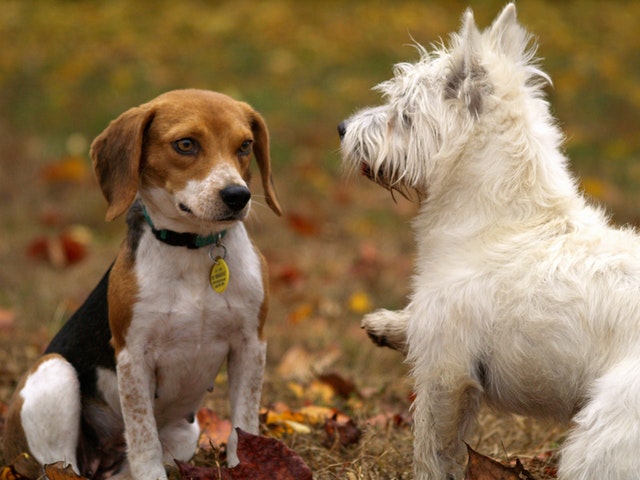Kennel Cough in dogs is a VERY contagious disease that means any dog can be infected easily once its in contact with the infected animal or even getting close to it. Signs of Kennel Cough in dogs vary depending on the condition of the disease as well as if it is an infection related to ONE causing agent (Bacteria or Virus) OR a combination of viral and bacterial infection.
Kennel Cough in dogs is a known disease with its persistent symptom, which is COUGH. But, we still need to differentiate between it and other dangerous diseases such as Pneumonia.
Our dogs depend on us to protect them from anything that may affect their life negatively. Remember, dogs the same as our babies, they are bigger, maybe, but they are just like kids. So, they still need our attention and observation.
Today, I want to go through few details about Kennel Cough in dogs; we will start by talking about what is Kennel Cough, then how dogs get Kennel Cough, after that, we will understand the different symptoms of Kennel Cough in dogs and how to differentiate it from Pneumonia and lastly how to diagnose it and treat it.

Table of Contents
What Is Kennel Cough?
Canine Infectious Tracheobronchitis is the other name of Kennel Cough. Also, Kennel Cough is a highly contagious respiratory disease of dogs. Kennel Cough is described by hacking and harsh cough that the dog owner describes as sounding like something stuck in your dog’s throat.
In general, dogs catch this disease when they get in contact with another sick dog, and the transmission is through airborne droplets, which is why it is highly contagious. This disease has many causes; the most common cause is a bacterium called Bordetella bronchiseptica.
Some dogs that caught the infection with Bardotella are infected with a virus at the same time. The virus weakens the dog’s body immune system, which makes it more susceptible to contracting a bacterial infection. These viruses include canine herpes virus, canine distemper virus, canine adenovirus, canine reovirus, and canine parainfluenza.
Dogs become infected with kennel cough when they inhale the virus or bacteria into their respiratory tract. Usually, the respiratory tract is protected with a coating of mucus that traps foreign bodies.
However, the problem starts when this protection is weak, and several factors cause that and make dogs prone to the infection and catch Kennel coughs such as Cold temperatures, exposure to dust or cigarette smoke, Travel-induced stress, and exposure to crowded and/or poorly ventilated conditions, such as are found in many kennels and shelters.

How Does Your Dog Get It?
As we said before, Kennel cough is highly contagious. This disease can infect dogs very quickly through the airborne droplet — however, any direct contact with the infected animal or by sharing of contaminated objects.
Several infectious organisms cause Kennel Cough; the most common one is a bacteria called Bordetella Bronchiseptica. Kennel Cough is also called Bordetella.
In most cases, a combination of both bacteria and viruses such as Canine Influenza or Canine Distemper causes Kennel Cough. The virus plays a huge role in affecting the immune system and make it weak and susceptible to bacterial infection (Bordetella).
Symptoms Of Kennel Cough In Dogs
There are different symptoms your dog may show, the typical and obvious symptom is cough. However, this cough would be a forceful and persistent one. Dog owners often say that the cough sounds like a goose honk. But this cough sound is different from dogs to others, especially little dogs, which is called a reverse sneeze.
Other symptoms the sick dog may show cold-like symptoms such as the runny nose, sneezing, or eye discharge. Note that Kennel Cough will not affect your dog’s physical activity; your dog will keep his appetite and energy within the average level.

Diagnosis Of Kennel Cough
As we said before, usually, the infected dog will still have the usual energy, and with a healthy appetite. However, encountering a coughing dog with poor appetite, fever, and looks tired in general, then we should suspect Pneumonia; your vet will evaluate your dog accordingly.
Your veterinarian will begin by taking a full history. Usually, the history starts with exposure to multi dogs in a closed range. After that, the physical examination will be carried, and the typical findings are the same as the symptoms your dog has.
Your veterinarian will suggest doing radiological imaging such as X-ray, and it will show signs of bronchitis in case of Kennel Cough, or other diseases such as Pneumonia if they are the cause.
Lately, veterinarians started to use PCR (polymerase chain reaction), which they have become available in many reference laboratories. They use this technology to magnify the presence of DNA in a swab; then, the lab can test for most of the Kennel Cough causing agents we mentioned before. This knowledge is the best way to help the experts to find the best therapy as well as understanding the disease better.

Treatment Of Kennel Cough In Dogs
The treatment of Kennel Cough in dogs can be different depending on the severity of the disease. Your veterinarian will prescribe a week to two weeks of rest for mild cases of Kennel Cough. However, the vet will also prescribe some antibiotics to prevent any secondary infection, and of course, some cough medications for the main symptom.
Also, Dr. Fitzgerald said that Nebulizers and Vaporizers are useful to utilize inhaled antibiotics or bronchodilators, and according to Dr. Fitzgerald, they showed some promising effect. They are beneficial, but they are not usually prescribed.
Additionally, your vet will suggest you get and use a harness instead of your dog’s collar as they are useful to reduce the irritation to the trachea. Any unpleasant irritation to the trachea will increase and worsen the cough and even cause more damage to it.

Prevention & Vaccination
The best treatment is prevention. Prevention in Kennel Cough can be achieved with three types if vaccinations against it: Nasal, Injectable, and Oral vaccination.
Although these vaccines don’t provide 100% protection and prevention, they provide proper protection, and they also decrease the severity of the disease itself and its symptoms.
Intranasal Vaccine
This type of vaccine is only available for Bordetella bronchiseptica, canine parainfluenza virus, canine influenza, canine distemper, and canine adenovirus type 2.
The vaccination can be given as a nasal immunization or as an injection for Bordetella bronchiseptica. However, for the adenovirus type 2, parainfluenza, and canine distemper, the vaccination is usually included and given for puppies with the essential vaccinations (DHPP).
There is controversy about which vaccination method is the best to provide better immunization. Or if it is better to give it as a combination of both injection and nasal.
Your vet will suggest giving the intranasal vaccination as early as three weeks of age, and the immunity from this method can last 12-13 months. Another advantage of this method is that the local resistance and defense will be at its best against the organisms because this is where the infection would try to take hold.
Note that it takes up to four days for your body to generate a strong immune response after the intranasal vaccination. As a common rule, Internasal vaccination provides faster protection than injections.
Oral Vaccine
Oral vaccination is more comfortable to give, and it is only available for Bordetella bronchiseptica (not for adenovirus or parainfluenza). The advantage of the oral vaccine is that the vaccine will be fully injected inside the mouth without losing any of it with a sneeze as that in the nasal vaccine.
Also, your vet will suggest giving the oral vaccine for puppies of eight weeks of age. Also, note that this vaccine is given annually.
Injectable Vaccine
Generally speaking, injectable vaccinations are an excellent choice for all dogs and puppies. For aggressive dogs, this method is the best choice to avoid any unnecessary unpleasant act from the dog as biting or attacking the vet.
For puppies, injection of the vaccine is the best way to boost the immune system as long as two doses are given with a one-month interval between them after age four months.
Also, note that Boosters are generally given annually. The Vaccination is not beneficial in a dog already incubated for kennel cough disease.

What If Kennel Cough Doesn’t Improve?
In mild cases, the infection should be self-limiting and resolve within one to two weeks. Also, the infection should be at least improved partially or notice some improvements after the first week of treatment.
If you don’t notice any improvement, you should take your dog back to your vet for a re-check examination. Failure of treatment to resolve Kennel Cough is a sign of an underlying condition.
Kennel Cough, caused by a viral infection, is the leading cause of a weak immune system. Because of that, the condition may progress to another disease such as pneumonia. Also, your vet may find another disease hiding that is non-infectious, such as congestive heart failure or any other condition that causes coughing.
Conclusion
Kennel Cough in dogs may be a rough condition on your dog, getting infected with a combination of bacteria and virus is tough on your dog’s body. However, knowing what is Kennel Cough in dogs is essential to be able to prevent the disease from happening or reduce its damage to the body.
We begin by knowing all the symptoms of Kennel Cough in dogs and the causes of Kennel Cough in dogs. Then, after checking all the signs of Kennel Cough in dogs, you can have a good idea if your dog has it or not. Depending on these signs and causes, we can understand and have a good idea on how to approach the treatment of Kennel Cough in dogs and how to deal with some complications. We also know how important to give our puppies vaccines to prevent and reduce the severity of the disease itself on our dog’s body.
So finally, I hope you found this article useful and informative. Let me know your answer. What do you think? Do you have more information or tips about Kennel Cough In Dogs? Write them down below.
If you have any other questions or different opinions about it, leave a comment below.
Today’s Quote:
“The reason a dog has so many friends is that he wags his tail instead of his tongue.” — Uknown Author
You’ll Also Love These Posts:
Studies have shown if you like this blog article — you will also love the following posts.


Thank you for sharing this really helpful information about Kennel Cough. Can I ask? How long should I wait before going to the vert if I see symptoms?
Hey Catherine,
I would suggest taking your dog immediately to your vet if you suspect this disease is the reason for your dog’s sickness. That is important for the vet to confirm the diagnosis as early as possible and to exclude other diseases that may cause the same signs. Also, I suggest you to talk to your vet about the vaccination options for your dog, it is a great way to prevent or reduce the signs and complications of Kennel Cough in dogs
Hi, thanks so much for the article. I have found it very interesting and useful. Since you are saying that the best way to prevent is to give an injection combined with the nasal, do you think it is difficult that I give the shot without taking the dog to the vet? Do you have any suggestions? Thanks, I appreciate it.
Hey Andrea,
Prevention and Vaccination can protect our dogs from various diseases and infections. In Kennel Cough, Both Injection and Nasal vaccinations are good to reduce the risk or the complications or signs effect on the dog’s body. However, it is always best to consult your vet before doing anything related to your dog’s health, simply because they know better what is better for your dog’s overall health. Also, they have better experience to deal with different breeds and different dog’s personalities.
One of my dogs recently developed kennel cough (although she has never been in a kennel) and it was actually scary because she was coughing so loudly. It sounded worse than it was but I hate to see my pets in distress like that. Antibiotics cleared it right up and she’s fine but it was scary to see. Thank you for this article. It is very detailed and informative. I was not aware that there is a vaccine for this condition. If your pup has to spend time in a kennel it may be worth vaccinating against it.
Hey Ric,
I am happy to hear that your dog is doing fine now! Kennel Cough can be scary the way it is, but with good care and prevention as mentioned above, it will be easier for your dog’s body to fight it and be healthy fast.